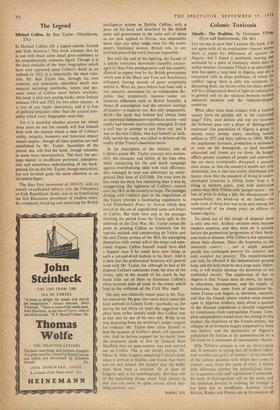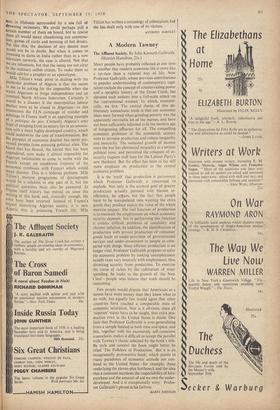Colonic Toxicosis
Algeria : The Realities. By Germaine Tillion. (Eyre and Spottiswoode, 10s. 6d.)
LET, me say at once that I admire this book. I d° not agree with all its conclusions—heaven knows there is room for differences of opinion on Algeria—but I found it profound, moving and animated by a spirit of humanity which does its author honour. Germaine Tillion is an ethnologist who has spent a long time in Algeria, and she is concerned with its basic problems, of which the conflict raging there is only one symptom. In discussing them, she throws what for many people will be a disagreeable flood of light on colonialism in general and on the relations between modern industrial societies and the 'underdeveloped' countries.
What effect does close contact with a modern society have on peoples still in the traditional stage? First, once disease and war are leisened. the birthrate goes into a phase of 'demographic explosion' (the population of Algeria is going to double every twenty years, reaching twenty million in 1975 and forty million in 1995). While the population increases, production is stationary or even on the downgrade, as land becomes exhausted and forests are cut down. As hunger afflicts greater numbers of people and communi- ties are more irretrievably disrupted, a parasite class arises, so that the country's wealth not only diminisheS, but is also less evenly distributed (the figures show that the standard of living in under- developed countries is falling faster than it is rising in modern ones). And with destitution comes what Mlle Tillion calls 'pauperisation': the loss of pride in doing a job, the abandonment of responsibility, the break-up of the family—the same kind of thing that was to be seen among the unemployed of the slump years, an offence to, human dignity.
To climb out of this slough of despond there is only one way. Archaic societies must become modern societies, and they must do it quickly before the geometrical progression of their birth- rate leads to disaster. Mlle Tillion is not optimistic about their chances. 'Since the beginning of the twentieth century . . . not a single peasant people has exchanged poverty for comfort, but only comfort for poverty;' The transformation can only be effected if the industrialised peoples help, and the help must be on a large scale. Other- wise, it will simply increase the distortion of the traditional society. The application of this to Algeria is that France must do more, far more, in education, development, and the supply of technicians; that some form of association be- tween France and Algeria is, therefore, essential, and that the French labour market must remain open to Algerian workers, since about a quarter of the Moslem population is directly supported by remittances from metropolitan Franoe. Corn- ' plete independence would mean the closing of this market, the departure of the French settlers, the collapse of an economy largely supported by these two factors, and the decimation of Algeria's population by famine or its demoralisation by a life lived on a minimum of international charity.
Mlle Tillion's analysis is not an encouraging one. It amounts to saying that all modern indus- trial societies are guilty of murder—of the murder of the archaic societies with which they come in contact—and, from this point of view, it makes little difference whether the industrialised coun- try in question calls itself capitalist or Communist. Its work of disintegration will be the same, and the resources devoted to undoing the damage it. has done just as insufficient. America, Great ' Britain, Russia and France are in the position of . men in lifeboats surrounded by a sea full of drowning swimmers. We could perhaps pull a certain number of them on board, but to rescue them all would mean abandoning our conversa- tion, games of cards and brewing of hot drinks. Put like this, the decision of any decent man Would not be in doubt. But when it conies to investing in dams in India rather than in a new television network, the case is altered. Not that we are inhumane, but that the issues are not clear to the ordinary selfish citizen. To make them so would call, for a prophet or an apocalypse. Mlle Tillion's weak point in dealing with the particular problem of Algeria is that she seems to me to be asking for the impossible when she wants Algerians to forgo independence and an eventual North African federation. Certainly it would be a disaster if the metropolitan labour market were to be closed to Algerians—in this connection the FLN campaign of murder and sabotage in France itself is an appalling example of a politique du Aire. Certainly Algeria's only hope of escaping from its misery lies in an associa- tion with a more highly developed country, which could underwrite the cost of transformation. But the prospect of economic disaster has never pre- vented peoples from pursuing political aims. The blood that has flowed, the hatred that has been engendered, now make it almost impossible for Algerian nationalists to come to terms with the French except on conditions (rupture of the economic symbiosis with France) which would n-lean disaster. This is a hideous problem. Mlle Tillion's massive programme of development would be a solution to one part of it, but the Political questions must also be answered. In France itself history has moved on since the writing of this book and ironically enough, the roles have been reversed. Instead of France's impact destroying Algerian society, it is now Algeria that is poisoning French life. Mlle
Tillion has written a toxicology of colonialism, but she has dealt only with one of its victims.
ANTHONY HARTLEY



































 Previous page
Previous page